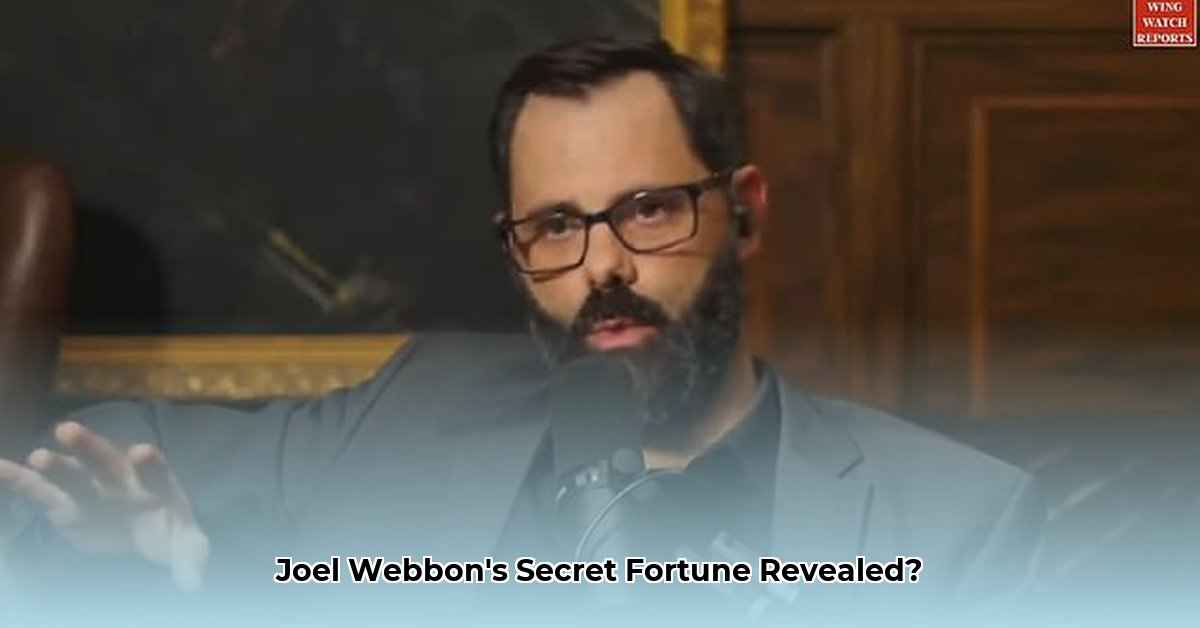
Estimating Joel Webbon's Net Worth: A Complex Calculation
Determining Joel Webbon's precise net worth is challenging. Unlike publicly traded companies, religious ministries often lack the transparency required for straightforward financial assessments. However, by examining potential income streams, we can attempt a reasoned estimation. His primary income sources likely include ministry donations, book sales, speaking engagements, and potentially, investments.
The size of Webbon's ministry significantly influences his potential earnings. Larger congregations and successful fundraising initiatives translate to higher potential income. Book sales, especially for best-selling titles, can generate substantial revenue over time. Speaking fees at conferences and events represent another significant income stream for many religious leaders. Finally, while speculative, investments could significantly impact his overall net worth. However, without access to private financial records, any figure remains an educated approximation. Available data may only offer a broad range, not a precise number. The lack of transparency surrounding the financial affairs of many religious leaders is a significant obstacle to accurate assessment.
Webbon's Teachings and Public Persona: A Critical Analysis
Webbon's public image and teachings often align with tenets of prosperity theology, a belief system connecting faith with material wealth. His sermons and public statements might emphasize the idea that financial success is a sign of God's favor. This theological perspective can shape how his followers perceive his own wealth accumulation. However, it also potentially creates a conflict, generating scrutiny regarding the juxtaposition of his personal wealth and his messages of humility and charity. His public stances on social and political issues further complicate this assessment. The congruence (or lack thereof) between his personal beliefs and his public pronouncements demands careful consideration.
Comparative Analysis: Webbon and Other Religious Leaders
Comparing Webbon's financial situation to other high-profile religious figures offers valuable context. Many prominent leaders have amassed considerable wealth, often sparking public debate and scrutiny. Figures like Joel Osteen, Pat Robertson, and Benny Hinn each present unique cases, highlighting the wide range of financial practices within religious leadership. Analyzing their situations helps contextualize Webbon's wealth within the broader landscape of religious financial practices. The significant variations in reported net worth values across different televangelists underscore the challenges involved in obtaining reliable financial information and the complexities of assessing a leader's wealth.
Ethical Considerations: Navigating the Intersection of Faith and Finance
The ethical implications of significant wealth accumulation within a religious context are profound and multifaceted. Some argue that a lavish lifestyle contradicts the principles of humility and service often associated with religious teachings. Countering this view, others maintain that significant financial resources are essential for supporting sizable ministries and large-scale outreach programs. This inherent tension between personal enrichment and the religious ideal of selfless service lies at the heart of the ethical debate surrounding Webbon's wealth and the prosperity gospel movement more broadly. The public perception of Webbon's wealth, therefore, is intrinsically linked to this complex ethical discussion, and to the gap—perceived or real—between his preaching and his possessions.
Transparency and Accountability: A Call for Greater Openness
The lack of transparency surrounding the finances of many religious organizations is a significant issue needing attention. Increased financial reporting requirements, coupled with independent audits, could significantly enhance accountability and foster public trust. This greater transparency is essential not only for evaluating individual religious leaders like Webbon, but also for ensuring responsible stewardship of congregational donations and ministry resources. Openness regarding the financial practices of religious organizations is crucial for reducing potential conflicts of interest, diminishing the possibility of misuse of funds, and guaranteeing responsible allocation of charitable donations.
Conclusion: The Ongoing Need for Scrutiny and Dialogue
The complexities surrounding Joel Webbon's net worth highlight the enduring tension between faith, wealth, and influence within religious leadership. Accurate financial assessment remains challenging due to limited public information. While estimations are possible based on potential income streams, the lack of transparency necessitates ongoing scrutiny and further investigation. The broader ethical questions surrounding the accumulation of wealth by religious figures remain a key area of discussion. Further research is needed to fully explore the complexities of this intersection, and to foster a more transparent and accountable environment within religious institutions. The need for open dialogue and further investigation remains paramount.